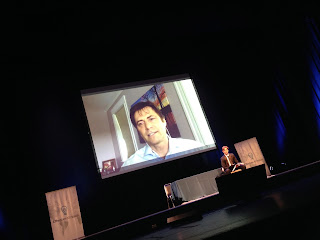Writing a thesis is to undertake an
ultra-marathon. For many students it will be the longest and most in depth
account of research they have undertaken to date. It’ll take a lot of training
and practice to get good at the writing. It requires perseverance, good time management skills, the ability to set long and short
term goals, and a commitment to follow through. It’s for this reason that I’m
very much in favour of celebrating the small successes, and undertaking shorter
term projects along the way.
In my case, these small projects have taken
the form of writing the occasional newspaper article, writing these relatively
short blog posts, participating in my first 5K race, and making a set of
personalized hand made cards and keeping up with my pen pals, among other
things. In some ways, even doing chores can feel like successes, as can staying
on top of doing the dishes, and doing your own cooking (which is also a good way to keep food costs down and manage your finances).
I submitted a draft of my last chapter on
Friday last week, and now I’m in revision mode, and it’s actually a lot of fun.
But it was really nice of my partner to help me to celebrate and recognize what
an accomplishment it was to finally finish a decent draft of that chapter,
which I’ve been working on for months now.
I find that when I keep up on small projects along the way, my motivation stays higher than when I don’t. I finish a blog post, up it goes, and I feel like I’ve accomplished something. It hasn’t been that often that I have that feeling with writing another paragraph of my thesis, or straightening another set of citations. So I encourage you to do what you need to make sure that you feel good about what you’re doing, whether it’s going to the climbing gym and figuring out another boulder problem (climbing lingo for route), or hosting a successful potluck with friends that you can’t make the time to see individually, or cooking up a storm and having meals for a week. Have your hobbies!
I find that when I keep up on small projects along the way, my motivation stays higher than when I don’t. I finish a blog post, up it goes, and I feel like I’ve accomplished something. It hasn’t been that often that I have that feeling with writing another paragraph of my thesis, or straightening another set of citations. So I encourage you to do what you need to make sure that you feel good about what you’re doing, whether it’s going to the climbing gym and figuring out another boulder problem (climbing lingo for route), or hosting a successful potluck with friends that you can’t make the time to see individually, or cooking up a storm and having meals for a week. Have your hobbies!
 |
| Big leaf maple (Acer mycropyllum) |
I suppose what’s behind all of this is encouragement to establish a good
work-life balance, which I struggle with, for sure. Undertaking a thesis can
seem to be all-consuming, and I think sometimes it can be difficult to feel
good about taking on other projects and non-grad school related things, but in retrospect, I'd say don’t be afraid to register for that pottery class, or join that soccer team,
or develop a writing group. These are all things that can help us realize how
important it is to support ourselves in different ways all along the way, and reinforce that we are not only our theses or grad work.
 |
| View from the Gorge on a beautiful fall day! |
Of course, don't be filling up your schedule to the extent that your thesis becomes a low priority, but a bit of a mix of things is definitely good.
Next I’ll write about my new job coming up, and transitioning out of grad school!
Next I’ll write about my new job coming up, and transitioning out of grad school!





















